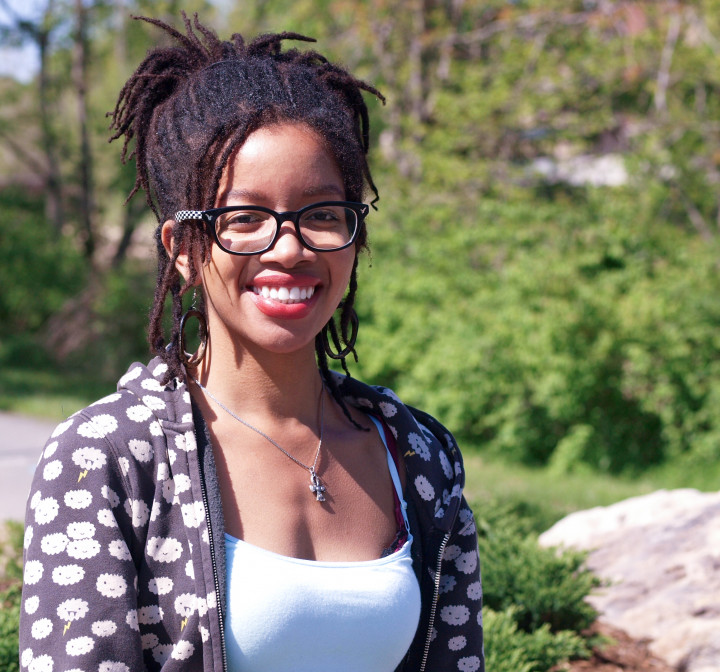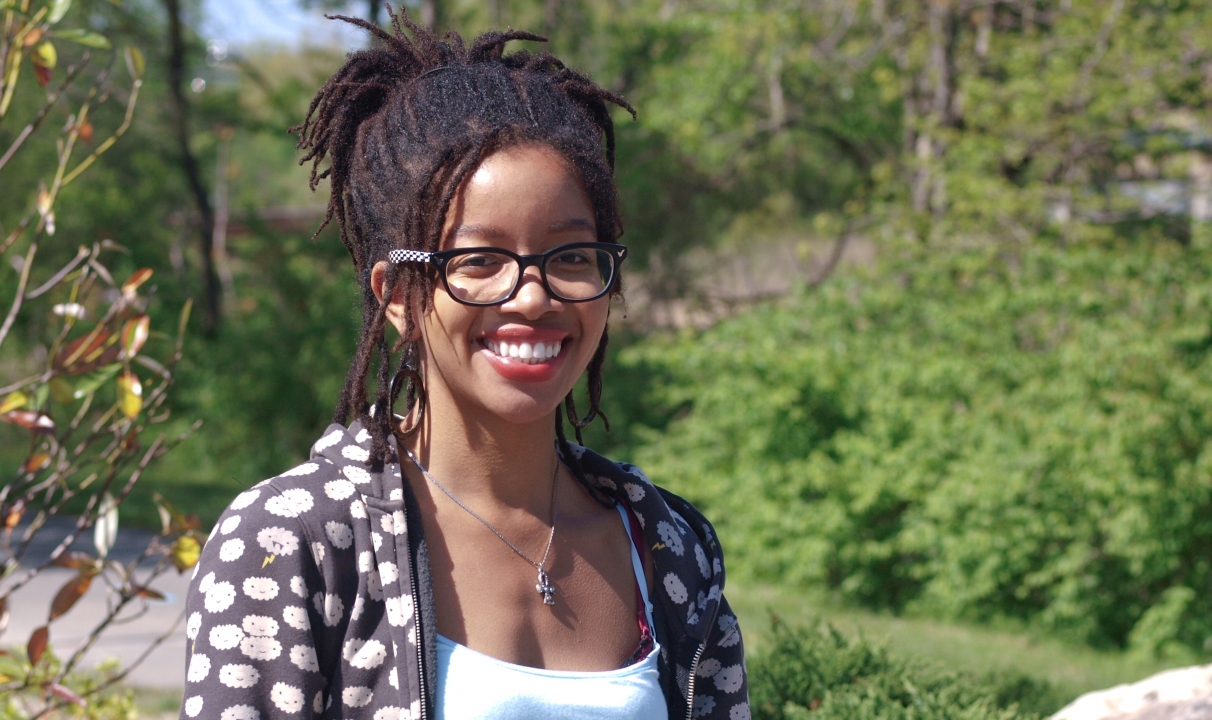Spotlight on Deonna Hodges
Deonna Hodges has elected to do as much as she can during her time as an undergraduate in the Department of Computer Science at the University of Maryland. Since her arrival to the department in the fall semester of 2010, she has helped revitalize the Association for Women in Computing (she is currently the president) and she has helped found the Startup Shell (http://startupshell.org/), the University of Maryland’s student-run startup incubator.
While not a traditional student as she did not arrive to the Computer Science Department right out of high school to pursue her B.S. in Computer Science, Deonna is indeed a traditional student in that she engages fully with her community, fellow students and faculty members through research, internships, and a myriad of other activities.
Luckily for us, she had a few moments to answer some questions about her experience as an undergraduate at the University of Maryland.
What drew you to join the Association for Women in Computing at the UMD? And consequently, what encouraged you to take a leadership role in the organization?
I went to a talk given by Dr. Jandelyn Plane, the AWC faculty advisor and a senior lecturer in the department, to discuss her thesis work about representation of women in Computer Science in Afghanistan. After the talk was over, I started chatting with one of the girls from my CS discussion sections. She invited me to an AWC meeting, and I became involved from there. I wanted to take a leadership role within the organization because I feel a personal drive and commitment to helping young women succeed in technical fields - I think it's important for all of us to help and support one other, and make it clear that we're all allies.
What do you think is the purpose of the AWC? What is its role in the Computer Science Department?
We exist to provide a support system for women in CS, and we have group tutoring during our weekly Code, Kvetch, Question. We encourage women to form study groups and prepare for technical interviews.
We also try to reach younger students via events like Girl Scout Day at the National Air and Space Museum, and programs like Computer Science Connect , which is run by Dr. Jandelyn Plane, AWC advisor and lecturer in the department.
In addition, we exist as a social outlet for folks in the CS department at UMD. Looking around in your classes, you don't see a lot of women around, and it can sometimes feel as if very few of us exist. It's great to have a central group of women and supports of women in CS to send the message, 'yes, we do exist,' and we're willing to provide help, support, or just a place to have fun and relax. I think many people see AWC as a "women-only" group, but I would like to mention that we're open to all - anyone who's supportive of the goal of helping further inclusiveness in the tech world can be part of AWC.
If gender parity is an objective of Computer Science departments everywhere, how do we get there? Do we start in elementary school (or even earlier)? How do we get women to learn about what it is that a computer scientist does? And what do you think of the Etsy bootcamp?
I think if we remove some of the negative stereotypes that people hold about women's competence in math and science, we'll see greater representation of women in CS. People begin to internalize society's messages about gender roles long before entering school, and even though most of us aren't yet parents, we need to be aware of the limiting messages the young children in our lives, brothers, sisters, nieces, and nephews - are given about gender roles.
I think efforts from companies such as Etsy are a huge step in the right direction. Even though 75% of Etsy shops are owned by women, there were only 3 women in its 100 person engineering team in 2012. One of their strategies to improve the gender balance was to give grants to support women attendees at Hacker School, which is a group that hosts summer long "writer's retreats for programmers" who want to build their own projects, contribute to open source projects, and learn new technologies. Because Etsy reached out to women, applications from women skyrocketed, and they were also able to recruits some of the talent from Hacker School. This is a great example of how we can reach out and encourage inclusion without having to change society's attitudes about gender, which can take a long time.
Your path to computer science is really interesting. How did you get here to UMD? What made you decide to come to UMD to study for a degree in Computer Science?
I'm 25 years old, and had quite a long path to majoring in CS. I originally went to Stanford University and majored in an interdisciplinary major called Science, Technology, and Society, which explores how societal and cultural values affect research and innovation, and how these innovations in turn affect society and culture. I was very interested in tech policy, and spent some time working as a research assistant with the Center for Internet and Society, which is the cyberlaw clinic at the Stanford Law School. I very much enjoyed my experience there, because it was a jumping off point, for what I realized was a strong interest in programming and software development.
You've worked on a research project with the current department chair, Samir Khuller, and some other students. Can you talk about the process of research? What makes research different from your classes?
For several months, a few other computer science undergraduates and I have been working to develop a web application that will allow individuals to arrange shared car rides with ease to solve some of the issues we've found with some of the major carpooling web applications that are currently out there.
We spent many hours apart from our normal classwork working on building the web application infrastructure, learning new web technologies, discussing user experience design and scalability issues, things that aren't normally covered as part of a traditional computer science curriculum. After building the initial iteration of the application, we discovered that the research component of the project would be significant - particularly in the case of working out answers to the algorithms-related questions, as well as the user incentives.
Because these were turning into full-fledged research questions, we decided to write a proposal to apply for the Collaborative Research Experience for Undergraduates (CREU) research grant, and were awarded the grant to help fund our efforts.
Who do you consider to be your role models or mentors in the field? Do you think that having a mentor is important for undergraduates?
As far as public figures go, Sheryl Sandberg is a major role model for me. Even though her role at Facebook isn't directly technical, I found her book Lean In: Women Work, and the Will to Lead, and her TED talk "Why We Have Too Few Women Leaders" to be incredibly inspiring for me, personally. Two things that particularly resonate with me are her discussion of impostor syndrome, which describes the feeling a lot of underrepresented groups have about their own success - that they're convinced that they're impostors who don't deserve their achievements, or that the achievements are the result of luck or tricking others into thinking they're more talented than they actually are, and her idea of "leaving before you leave" which describes how many women mentally check out of their own careers - opting out of promotions, increased responsibility at work, and interesting projects, because they anticipate having a family.
I'm going to deviate a bit here from traditional wisdom about 'mentorship'. I think this kind of relationship is tremendously beneficial, but happens naturally. I don't think people should be so much focused on finding a mentor as they should be determining where their true interest and talents lie.
I know that you've done some work in Entrepreneurship by being a co-founder of a startup lab on campus. Can you tell me a little bit about the lab, and what inspired you and your co-founders to get this exciting venture moving?
Even though we already have impressive entrepreneurship resources at Maryland - Mtech, the Dingman Center, the Hinman CEOs program, we felt we could benefit from a space where we can bounce around ideas and learn from other student hackers and entrepreneurs. We were inspired by StartX, which is a student run startup incubator on the Stanford University campus. The Startup Shell has had a number of wonderful student-run tech talks so far, including introductions to 3D Printing, Amazon Web Services, Adobe Illustrator, Chrome Developer Tools, and the Arduino microcontroller.
What has been your favorite CS class that you've taken while at UMD?
CMSC 424, which is Database Design with Prof. Roussopoulos. It had a large project at the end, building a web application for a pizza delivery service. I found the process of designing a functional, real-life web application from scratch to be one of the most valuable projects I've worked on in any of my classes, because it was completely open-ended and Prof. Roussopoulos gave us full control over the design of the back end. Many people in the class had not previously experienced with using any of the popular web application frameworks and front-end technologies. I liked the fact that the project required a lot of self-directed learning to encourage us to learn new web frameworks, and to work with complex, back-end queries and transactions. What advice, if any, would you give to any student thinking about majoring in Computer Science? What advice would you give to someone who has never programmed? Start tinkering as early as possible. Any idea that grabs your imagination, try to put it into action, even if you don't think you yet have the skills to implement it. No matter how trivial it may seem - a game modification, a little script that simplifies some repetitive task, get it up on github, and try to build your programming muscle early.
There are tremendous resources out there - online and in the department, and the best thing that will benefit you during your programming career is the ability to pick up new technologies quickly.

